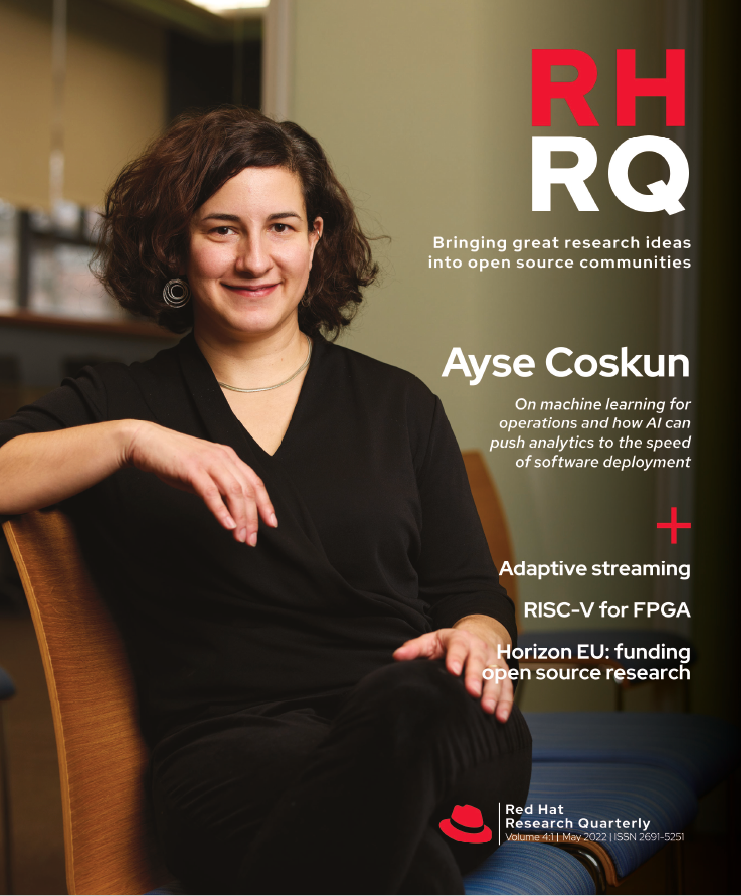Red Hat Research Quarterly
Highlights from this issue
Machine learning for operations: Can AI push analytics to the speed of software deployment?
An interview with Ayse Coskun
Volume 4, Issue 1 • ISSN 2691-5278
Departments
Features
Inside this issue
Red Hat Research is participating in an initiative in the space of image disinformation detection, that is, determination of false information within images that are intended to mislead. The project began January 2021 in response to the need for more mature tooling in the fairly nascent space of image forensics and analysis using statistical and […]
The competing demands of cost and performance make it challenging to optimize stream-processing applications. Current research is exploring new options. Extracting value from streams of events generated by sensors and software has become key to the success of many important classes of applications. However, writing streaming data applications is not easy. Developers are confronted with […]
Why open source hardware will play a key role in emerging technologies research RISC-V Instruction Set Architecture (ISA)-based microarchitectures are an important part of all Field Programmable Gate Array (FPGA)-based research projects in the Red Hat Collaboratory at Boston University. Having CPU cores in FPGA designs is important: partitioning workloads between special purpose FPGA circuits […]
Three principal software engineers and sought-after research collaborators share their insights on this critical EU innovation incubator. In February 2021, the European Union launched Horizon Europe, the next phase in its flagship Framework Programme for Research and Innovation. Horizon Europe, which will fund research from 2021 to 2027, was created to drive innovation, research, and […]
RHRQ asked Professor Ayse Coskun of the Electrical and Computer Engineering Department at Boston University to sit down for an interview with Red Hatter Marcel Hild. Professor Coskun is one of the Principal Investigators on the project AI for Cloud Ops, which recently won a $1 million Red Hat Collaboratory Research Incubation Award. Their conversation […]
Researchers, students, and software engineers all have something to gain and something to give when checking out research interest groups. I was going through my coat pockets recently and found an old pair of Red Hat sunglasses. The plastic shade part of the sunglasses had popped out on one side, so if you put them […]
Each quarter, Red Hat Research Quarterly highlights new and ongoing research collaborations from around the world. This quarter we highlight collaborative projects in Israel at The Technion, The Ben Gurion University of The Negev, Ariel University, Reichman University, and The Hebrew University. Contact academic@redhat.com for more information on any project described here, or explore more research […]
As the universe of open research clouds keeps expanding, so does the visibility they provide. In 2014, Orran Krieger, Professor of Electrical and Computer Engineering at Boston University (BU), and Peter Desnoyers, Associate Professor at the Khoury College of Computer Sciences at Northeastern University, launched an initiative called the Mass Open Cloud (MOC). Since then, […]
January 1, 2022, marked the official start of a new three-year research collaboration between Red Hat Research and Karlstad University around eBPF and security in the Linux kernel. eBPF is a technology that supports running sandboxed code in the running Linux kernel without having to change the source code of the kernel itself. PhD student […]
Red Hatters have been teaching at universities for almost fifteen years. Now, all that amassed expertise will be available on the Red Hat Research website to be used more widely. The relationship between Red Hatters and these universities has a long history. This is especially true in Brno, where a substantial portion of today’s senior […]
Three years ago, I opened my first column in the first issue of this magazine by expressing my sense of good fortune at being able to start something completely new: not just a magazine, but an entire organization devoted to research on computer infrastructure done entirely in open source. Looking back on it today through […]
















